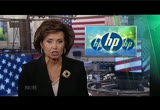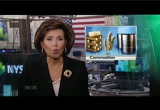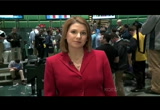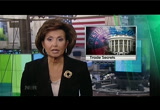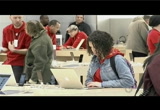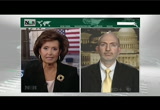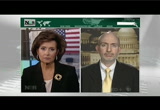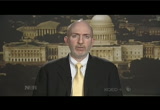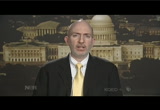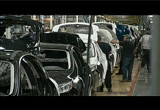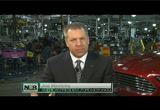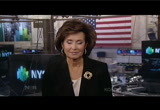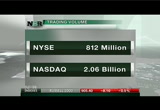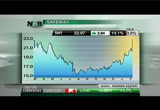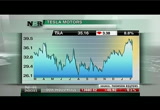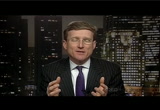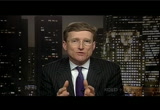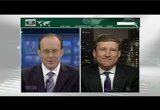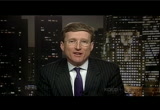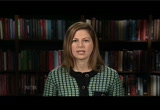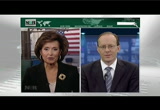tv Nightly Business Report PBS February 21, 2013 6:30pm-7:00pm PST
6:30 pm
captioning sponsored by wpbt >> this is n.b.r. >> susie: good evening. i'm susie gharib. hewlett-packard's turnaround gains traction, c.e.o. meg whitman in with a winning quarter and an improved outlook. >> tom: i'm tom hudson. from weakening demand, to currency concerns, we look at what's behind the big selloff in commodities. >> susie: and u.s. companies and infrastructure are increasing under the threat of cyber attack. we look at a new plan tying safeguards to trade policy. >> tom: that and more tonight on "n.b.r."! >> susie: on the comeback trail, hewlett packard posting better than expected first quarter results tonight, as a wide- ranging revamp of the struggling computer maker takes hold. and its shares take flight,
6:31 pm
rising over 6% in after hours trading. h.p. earned $0.82 a share, $0.11 better than wall street had anticipated. and revenues, while down at $28.4 billion, also beat the street. c.e.o. meg whitman has been on the job 17 months, speaking with investors today, whitman said she felt good about the rest of the year, and that last year's hard work was paying off for h.p. but, analysts say h.p. is not out of the woods yet. >> it's the type of thing that can be fixed quickly. this isn't going to take several years to play out so first of all it seems like meck whitman's vision is very much on track but we're not seeing that play out in the financials, but it is encouraging that guidance was better than we thought it would be. >> he also says he expect morse write-offs and pain from previous acquisitions ahead for hp. meanwhile shares close the regular session at $17.10 but as we mentioned earlier this were up as much as 6%
6:32 pm
on extra hours on the earnings numbers. >> still ahead on our program tonight, ford is hiring in high oy, please take a look creating new job. the u.s. economy is not adding jobs, the claims for uninsurance benefits up pas past-- combined with continued worries about economic growth lead the major stroke averages lower within the s&p 500 off by 9.5. >> susie: stocks weren't the only investments falling today. many commodities also ended lower, on top of steep declines yesterday. u.s. oil futures fell to there lowest point this year, closing at $92.84 a barrel. so what's at the root of the commodities sell-off, and will it continue? erika miller reports. >> reporter: selling was heavy in crude oil today, as it was in most commodities.
6:33 pm
but crude also fell on new inventory data showing a big jump in oil supplies. >> today we had an inventory number which came out, which we were expecting a build of around two million barrels. we got a build of around four million barrels. >> reporter: across the room, gold futures were little changed. although industrial metals like platinum and palladium got slammed. grain prices also plunged, with wheat hitting an eight-month low today. the thomson reuters-jefferies c.r.b. index, a global commodities benchmark, fell 1% today. that's the sharpest one-day slide since early november. a big factor behind all the declines is a rally in the dollar. another driving force of the sell-off in commodities is worries about the global economy. if growth falters, there will less demand for most raw materials. the minutes from the federal reserve's most recent meeting suggested the central bank may wind down its bond buying program sooner than expected. >> people see that the world economy is being partially
6:34 pm
sustained by this money printing. so, if there's going to be a constriction in that flow, that could crimp activity. >> reporter: but for now, some traders don't think crude will head much lower: >> right now, i'd be looking to maybe get my toe back in to by around the $92 level. it has come off so far so fast. >> reporter: when it comes to gold, some bulls are confident the yellow metal will soar past $2,000 an ounce this year or next. that's because many countries want to devalue their currencies. >> net net, all the currencies in the world are in a position of wanting to devalue themselves, whether its to spur trade, or reduce the liabilities of the debts these nations need to pay. >> reporter: and in that environment, he thinks gold will prove to be a shining investment. erika miller, "n.b.r.," new york.
6:35 pm
>> tom: from food inspectors to t.s.a. employees, federal workers could begin mandatory unpaid leave, as early as april first. that's if the massive cuts to government spending known as the sequester take effect on march first. most federal agencies are required to give workers 30 days notice, before beginning furloughs. its expected workers will be asked to take one day unpaid leave per week, or every two weeks, through september. >> susie: the white house is threatening to use trade enforcement authority and sanctions to punish nations that steal u.s. trade secrets. that sounds good and seems fair, but actually putting such a policy into practice is much
6:36 pm
harder than it sounds. to begin with, it's not always clear who is conducting a cyber attack and options to counter it are still only just being developed. darren gersh takes a look at the challenges of getting tough on cyber thieves. >> reporter: when a country like china dumps tires or other products on the u.s. market, it's pretty clear how to respond: raise tariffs and slap penalties on the producers. but how do you punish a chinese company that is suspected of receiving trade secrets through a government operation the government of china refuses to acknowledge? >> how you sanction a country with regards to cyber-espionage? i think we are still writing the book on that. it's a brand new area of exploration and i don't think policy makers really have the definitive word on how this will be accomplished. >> reporter: a new report says shanghai is home base for a massive chinese hacking effort that may involve thousands of people, but the u.s. and most other countries also employee secret armies of programmers engaged in some form of cyber- espionage.
6:37 pm
and that makes it harder to define a diplomatic solution to the problem. >> a lot of the most important military information in the world is on weapons systems that are developed by private corporations whether in this country or other countries around the world. so drawing those lines is not easy. >> reporter: efforts by the white house to protect basic infrastructure and critical companies from cyber attack show this is not just a question for spies. investors need to be thinking about this challenge too. >> so the question shareholders should be asking is, is the board of directors focused on this problem. is the c.e.o. focused on this problem? is it a top priority? how are they organized for it? are they spending the right time and money and resources? >> reporter: as washington ramps up cybersecurity efforts, companies may also have to rethink the products they offer to consumers and businesses. >> i think we are sacrificing security for convenience in many cases. this makes our life, our work a lot easier to accomplish and it's cheaper. but the flip side is there may
6:38 pm
be a trade off in terms of security and resilience that makes it easier for bad guys to cause mischief. >> reporter: while cyber attacks are very sophisticated, many of them still rely on human error to penetrate computer networks. in other words, the best policy is to think before you click. darren gersh, "n.b.r.," washington. >> susie: joining us now richard bejtlich. he's the chief security officer at mandiant, that's the cyber security firm working with the new york times and others, to combat recent attacks blamed on hacker groups in china. if he richard, let me begin by picking up on a point that darren brought up in his package there that your report says that companies and countries can be pinpointed of where the source of the attack really came from. can we actually do it that specifically? is that possible? >> it is possible when you have an acter that is so aggressive that takes so much data over a sustained
6:39 pm
period of time n this case over seven years, 141 companies. you can't apply that to all actor its. but for a case like this you can make that conclusion. >> what advice do you have for companies that are on the one hand trying to make information available to employees and others and they put that information on the i cloud but on the other hand they have to save guard that information and protect it from hackers. what is your advice? >> you need to treat this as a business problem. it isn't a technology problem. you need to see if your company is looking for intruders on your network. you need to be able to ask your it or security department how many intrusions have we had, not attacks but how many successful intrusion os kurred and how quickly did we deal with them. do we have a program that deals with it and what is the result of that program? >> as you know companies have been very reluctant to say that their network has been hacked into. but are you now encouraging companies to come forward.
6:40 pm
>> i wouldn't necessarily say we are encouraging companies to company forward but we would like to see a change in the culture. we need to keep focus on a threat here. it's not the fault of a company, necessarily, that they've been hacked. we need to make more of the focus around what you do after the tack, how you handle it. are you responsible with that information. unless about just because are you hacked, there is some sort of a negative stigma associated with it. >> uh-huh. and what does this mean for investors. we're hearing that just about every fortune 500 company is under the risk of some kind of attack. so how do investors protect their portfolios from these investments and also snowin snowing-- knowing that the companies they've invested in are at the threat that their secrets could be stole then a flash. >> so companies are at risk but manned on's own research shows that not every company has a severe problem associated with state sponsored es meanage. what i would say is pay attention to the statements that companies are delivering to the sec.
6:41 pm
since october of 2011 the sec has been fairly involved in looking for disclosures and asking companies questions whether or not it had intrusions. this information is on-line, on the databases and i encourage you to take a look at it. >> we have to do a lot more research than just looking at where the company is a good investment or not. what about any at thes that-- tips that you have for the rest of us who get an e-mail. it looks like it's an official company e-mail and you click on it and create half okay, as darren said think before you click but any other advice on that? >> compass's exactly right. i would say when you get an e-mail like that if you need to verify it use the phonement don't go through a clicking a link or something like that. take it to an out of band mechanism like calling the investor help line or something like that to try to validate whether or not the company sent the e-mail. >> all right, a lot of good advice on a very important issue. we really appreciate you coming on the program. chief security officer at
6:42 pm
mandiant. >> susie: one bright spot in the lackluster economy has been auto sales. demand for new cars and trucks, and auto loans has been strengthening. that demand holds the potential for more jobs in the auto sector. ruben ramirez reports. >> reporter: the u.s. auto industry has undergone a major transformation over the last 13 years. at its peak in june of 2000 it employed 300,000 people. that bottomed in january of '09 at 122,000. over the past four years, automakers have added 50,000 jobs.
6:43 pm
analysts point out that for each of those jobs assembling cars in the u.s., they support nine others along the supply chain. >> the auto industry taking a lead and adding jobs is a good thing. >> reporter: while it will take a lot more for the industry to return to the level seen in the year 2000, automakers are adding to their payrolls at a healthy pace. chrysler is expected to announce in coming weeks that it is also adding jobs to boost one of its facilities in indiana. general motors says it expects to add about 1,400 new jobs over the new few years. and, last month, ford announced it will be adding 2,200 salaried employees this year, some of those will be at a cleveland engine plant where today it announced the addition of 450 jobs. >> these jobs, some of them will be people transferring in from other locations where we may have available people but the majority of them will be new hires and they will fall under the new agreement we did in
6:44 pm
2007. >> reporter: in recent years, ford had shuttered two plants in that same ohio area. but today's expansion comes as ford moves production of it's eco boost engine from spain back to the u.s. because demand for the engines and fuel efficient cars is booming. >> the auto consumer seems to be very resilient and very strong. we think it has a lot to do with pent up demand given the last several years the car has aged and replacement is necessary. >> reporter: as simple as it sounds, higher demand for cars means there's a need for more people to produce them. >> the year is still early and we've had some good announcements already about jobs being added so i think we'll wait and see whether or not we'll top last year. >> reporter: while the hiring trend is moving up, auto industry watchers point out that any new jobs to be announced this year have been in the planning for at least a couple of years. ruben ramirez, "n.b.r.," washington. >> susie: many americans have given up cable, and are now following their favorite television shows online. so many, that the nielsen company says it will now being tracking televisions connected
6:45 pm
to the internet, counting them as a quote, "television household." it's a step the ratings firm calls necessary, saying it will help give a more detailed picture of how people are consuming media. tom, nielsen is also looking into just how many viewers are watching on devices like the ipad. >> tom: let's get going with tonight's "market focus." >> tom: stocks saw more mild selling pressure today compared to yesterday as they continued to pull back from five and half year highs. the s&p 500 was in negative territory for the entire session. a drop in manufacturing activity in the philadelphia region, and the rise in first time unemployment insurance filings hung over the market. the index finished lower by 0.6%. volume remained heavier than it has been recently 812 million shares moved on the big board. just over two billion traded on the nasdaq.
6:46 pm
while today's losses were muted, they continued to be across sectors. the materials, technology and financial sectors all fell by 0.9%. one of the bright spots, though, was wal-mart. last week, an internal memo was released regarding a disappointingly slow start to february sales. today, wal-mart released earnings over the holiday season. the retailer earned $1.67 a share. up from last year, and a dime better than estimates. the gains came despite sales at u.s. stores open for at least a year coming in flat. shares gained 1.5% on heavier than usual volume. on a conference call executives said the store has cashed fewer tax refund checks than it did last year at this time, but it has been picking up in the past week. the company also increased its shareholder dividend. another company on the front lines with consumers, grocery store safeway. shares shot up to an 18 month high, rallying 14.1%. volume jumped seven-fold thanks to a strong earnings report even as it faces competition from wal-mart and others. safeway earned $0.94 per share,
6:47 pm
a significant increase from last year, and well above wall street estimates. the store said sales continue to gain momentum, crediting gas- station rewards and customer loyalty programs. among the drags on the financial sector were some of the big banks. bank of america fell 3.2%. it recently traded at a year and a half high. same for goldman sachs, which lost 2.8% today. morgan stanley was down 2.5%. home depot shares fell 3.1%. it has been one of the best dow jones industrial stocks over the past 12 months. earlier, ruben reported on hiring in the auto industry. electric car maker tesla, though, warned of new cost cuts as it lost more money than feared last quarter. shares fell 8.8%. with the company selling its model "s" sedan, the stock was at a 52 week high earlier this month. troubles in europe continue to hurt verifone's business. the company is a credit and
6:48 pm
debit card payment processor, and shares fell hard, down more than 40%. volume was very heavy. verifone cut its outlook. it has been trying to shift its business away from equipment sales to one oriented toward providing payment services. four of the five most actively traded exchange traded funds were lower. the s&p 500 volatility note gained another 1.9%, moving in the opposite direction of the broad market. and that's tonight's "market focus." >> tom: in the past six years investors have had an incredible
6:49 pm
appetite for i.o.u.s. since 2007, almost $2 trillion have been invested in bond mutual funds. over that same time, almost a half billion dollars have been pulled from stock funds. meantime, bond interest rates have inching higher, and prices moving lower. john sweeney is an executive vice president at mutual fund giant fidelity investments. he joins us from boston. john, it's great to see you again r most of those mutual fund investors taking too much risk with bonds? >> well, tom, the important thing to think about with bonds is that we've had a flight to bonds as a safety mechanism. people have gotten concerned about the volatility in the equity markets and moved their portfolio to bonds. what we ask folks to i have about is how much bond portfolio dow need in your portfolio. has to be a balanced mix and we ask folks to think about the time horizon in which they need to use the money. most people obviously focused on retirement. i think with the demographic shift of people ageing in
6:50 pm
america we going to continue to see people continue to buy bonds as they put more ballast in their portfolio. i want to caution though and say that at the same time you need to have some significant equity exposure on rising that investors might make as they approach retirement is they need to have some equity exposure to make sure they can last and combat inflation during retirement distribution. >> let's talk about that ballast that you call it, that balance between stocks and bonds in. past couple of years with the stock rally off its 2009 lows and the bon market it be did -- market rally has both of them moving higher. has the traditional role of bonds, the ballast against stocks changed? >> i don't think that it has. what we would ask folks to think about is what is the role that you want bonds to play in your portfolio? everyone should have an age appropriate mix of bonds in their portfolio. a young investor would have relatively little exposure to bonds because they're looking for growth. again an investor who is 65 and just approaching retirement would probably have about 40% of their portfolio in bonds. somebody who is later in their retirement years may have more exposure to fixed
6:51 pm
income because they have less time that they need to have capital appreciation and inflation pro fiction from equities. >> does the old rule of 100 minus your age equal your bond expose heuer-- exposure still count? >> it's a good way to think about it, a good proxy. there are the los of ways to think about asset allocation. one is your risk tolerance and how much you want to think about your time horizon. so if we ask folks to think about the different buckets of money that they have, college savings is one, time frame that is obviously shorter than retirement. if you are saving for a house you obviously want a shorter duration, so again, your portfolio may look different depending on the different goals you have for your money. >> talking about duration one of the biggest risks out there is long time bond investors know is inflation. but today we saw consumer inflation was flat for the second month in a row so, can bond investors write-off inflation in a short or even medium term? >> i don't think they should. they should absolutely be having a watch ufl eye around inflation with. we have seen gas prices
6:52 pm
climb significantly over the last few months. gas is not a factor in the most inflationary measures so really that's something that you pay for out of pocket. and we should certainly take that into consideration and people should be taking these into account. inflationary pressures particularly over long periods of time. >> certainly investors have been searching for yield not only in the bond market but also in the stock market just witness the rise in dividend paying stocks. are they reaching too much for yield, taking on credit risk, in other words, risk about that bond being able to be paid back? >> certainly investors have is out yield in other places other than bonds. so the u.s. ten-year treasury yielding 2%. people have looked it treasuries yield --.5%. the krupp side su get dividend payments plus potential for upside in the stock. the ris something obviously the companies cut the dividend and the stock can fall. so you want to be cautious about how much dividend exposure you put in your portfolio but that's a very good place for investors to look for additional yield.
6:53 pm
we've also seen investors looking for yield in places like high income bond, looking at non-u.s. debt as well. other places where they can continue to get exposure as long as they understand there are principal risks there as well. >> there is no reward without risk in any kind of market regardless of the conditions. the bond market tonight with john sweeney with fidelity investment. thank you. >> susie: tomorrow on "n.b.r." our friday market monitor guest is focused on the rebound in global growth, looking for deals in the technology, industrials and materials sectors. he's david lefkowitz, senior equity strategist at u.b.s. how do you teach your kids one of the biggest money and life lessons of all? alisa weinstein has some tips in tonight's kids and cash, she's author of "earn it learn it" and founder of "help kids fly". >> there are three little words children say that every parent should love to hear. we're talking heart-warming like nobodys business. those three words?
6:54 pm
it's not fair. it could be about pieces of candy or who gets to pick the book to read at bedtime, its not fair is the best. why? because life isn't fair. and the sooner kids learn that their happiness is not dependent on how much someone else has, the more fulfilled they'll be. especially when you're talking about money. the second my four-year-old realized i paid him less than his older sister, you got it. it's not fair. and i suspect, if you have more than one kid at home-and you're paying two different amounts- you've heard it, too. so, what to do? ask your younger child why aren't you earning as much? adult salaries take into account many factors, and years of experience play a big part. next ask, what responsibilities does your older sister have that you don't yet? maybe she pays for her own school lunches or extracurricular activities. and this is my favorite question, what can you do to earn more? give your kid a second to come up with his own solutions.
6:55 pm
that's problem-solving at its best. so if you're teaching money management to kids of different ages, remember, life isn't fair. but teaching a great lesson can really warm your heart. i'm alisa weinstein. >> tom: kids play a big role in how we spend and the brands we buy. our "nbr-u" partners at wharton have more on explaining marketing and advertising to your kids. you'll find it on: www.nbr.com just look for the "nbr-u" tab. >> susie: and finally tonight, "n.b.r." made some news of its own today. our program was acquired by financial cable television network c.n.b.c. but rest assured, the same high quality, insightful program will continue each week night right here on public television. that's "nightly business report" for thursday, february 21. have a great evening everyone, and you too tom. >> tom: goodnight susie, we'll see you online at: www.nbr.com and back here tomorrow night.
6:56 pm
137 Views
Uploaded by TV Archive on

 Live Music Archive
Live Music Archive Librivox Free Audio
Librivox Free Audio Metropolitan Museum
Metropolitan Museum Cleveland Museum of Art
Cleveland Museum of Art Internet Arcade
Internet Arcade Console Living Room
Console Living Room Books to Borrow
Books to Borrow Open Library
Open Library TV News
TV News Understanding 9/11
Understanding 9/11

